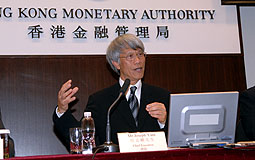 |
| Uncertain outlook: Monetary Authority Chief Executive says the Exchange Fund will be unlikely to achieve the same high return seen in 2006 due to the complex investment environment. |

|
The Exchange Fund recorded an investment income of $103.7 billion last year, almost triple the $37.8 billion in 2005, with a 9.5% return rate, Monetary Authority Chief Executive Joseph Yam says.
The share attributable to fiscal reserves was $28.9 billion - 59% higher than the $18.2 billion estimated in the Budget.
Announcing the Exchange Fund's investment results today, Mr Yam said the investment income was the second-highest absolute figure while the 9.5% return rate was the fifth-highest since 1994.
Main components
The income's main components were a valuation gain on, and dividends from, the Hong Kong equities portfolio at $35.9 billion; a valuation gain on, and dividends from, other equities at $20 billion; an exchange valuation gain of $17.3 billion, mainly as a result of the appreciation of other currencies against the US dollar; and a total return from bonds and other investments of $30.5 billion.
After deducting interest and other expenses, last year's net investment income was $93.5 billion. The share attributable to fiscal reserves was $28.9 billion. An amount of $64.6 billion, being the net investment income after deducting the fiscal reserves' share, was added to the Exchange Fund's accumulated surplus for 2006. At the end of 2006, the surplus stood at $507.7 billion.
Mr Yam said last year's investment environment was challenging, with global financial markets experiencing a volatile year.
Challenging environment
"While the bond markets benefited from expectations of a deceleration in growth in the US, the equity markets experienced a late rally from positive earnings and mergers and acquisitions activities. Record initial public offering activities and a generally strong domestic and regional economy took the Hong Kong stock market to new highs. The US dollar weakened against European currencies while remaining flat against the Japanese yen.
"Against this environment, the Exchange Fund outperformed the benchmark by 63 basis points, compared with 24 basis points in 2005 and the investment return of 8.9% for the benchmark portfolio determined by the Financial Secretary after consultation with the Exchange Fund Advisory Committee," he added
It was equivalent to $6.6 billion, or almost 10 times the authority's administrative spending in 2006.
Since 1994, the Exchange Fund has generated an annual return of 6.6%, compared with the annual inflation rate of 1.3% over the same period.
The Exchange Fund's total assets rose $109.9 billion over 2005, to $1.177 trillion last year.
Commenting on this year's outlook, Mr Yam said the investment environment was likely to be a complex one.
Complex outlook
"It is unlikely that the Exchange Fund will achieve the same high return seen in 2006. The rise in equities markets that we benefited from in 2006 makes the prospects for those markets in 2007 more uncertain. Economic buoyancy and excess liquidity have led recently to some volatility in asset markets, and this may well increase.
"Uncertainties in the global economy, and particularly in the outlook for inflation in major economies, also make it difficult to predict trends in interest rates.
"High levels of liquidity in financial and assets markets, coupled with firms' willingness to bear risks out of their management ability because of the economic upswing, may lead to financial stability," Mr Yam said.
Prudent approach
He stressed although the Exchange Fund must be invested, it is not an investment fund and investment is not its primary purpose. Under the Exchange Fund Ordinance, the fund aims to affect the exchange value of the currency of Hong Kong and to maintain the stability and integrity of Hong Kong's monetary and financial systems.
"Those purposes mean that we take a prudent approach to investment, focusing on capital preservation and liquidity rather than return, and that approach will continue," he said.
Mr Yam reiterated the Linked Exchange Rate System will stay, adding the authority has not interfered with market operations.
Go To Top
|



